人教版九年级上册英语第二单元
- 格式:wps
- 大小:96.50 KB
- 文档页数:6
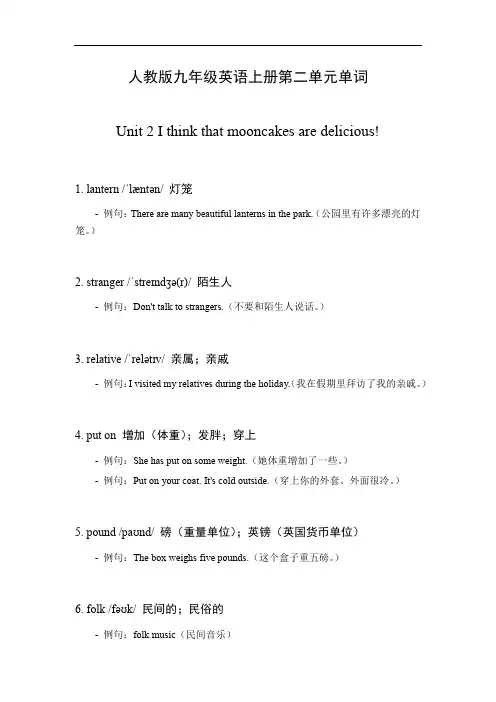
人教版九年级英语上册第二单元单词Unit 2 I think that mooncakes are delicious!1. lantern /ˈlæntən/ 灯笼-例句:There are many beautiful lanterns in the park.(公园里有许多漂亮的灯笼。
)2. stranger /ˈstreɪndʒə(r)/ 陌生人-例句:Don't talk to strangers.(不要和陌生人说话。
)3. relative /ˈrelətɪv/ 亲属;亲戚-例句:I visited my relatives during the holiday.(我在假期里拜访了我的亲戚。
)4. put on 增加(体重);发胖;穿上-例句:She has put on some weight.(她体重增加了一些。
)-例句:Put on your coat. It's cold outside.(穿上你的外套。
外面很冷。
)5. pound /paʊnd/ 磅(重量单位);英镑(英国货币单位)-例句:The box weighs five pounds.(这个盒子重五磅。
)6. folk /fəʊk/ 民间的;民俗的-例句:folk music(民间音乐)7. goddess /ˈɡɒdes; ˈɡɒdəs/ 女神-例句:She is regarded as a goddess.(她被视为女神。
)8. whoever /huːˈevə(r)/ 无论谁;不管什么人-例句:Whoever comes will be welcome.(无论谁来都将受到欢迎。
)9. steal /stiːl/ 偷;窃取-例句:Someone stole my wallet.(有人偷了我的钱包。
)10. lay /leɪ/ 放置;安放;产(卵);下(蛋)-例句:She laid the book on the table.(她把书放在桌子上。
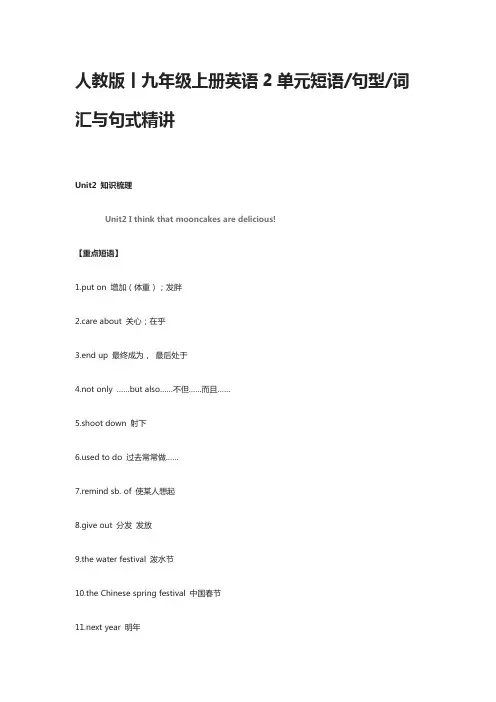
人教版丨九年级上册英语2单元短语/句型/词汇与句式精讲Unit2 知识梳理Unit2 I think that mooncakes are delicious!【重点短语】1.put on 增加(体重);发胖2.care about 关心;在乎3.end up 最终成为,最后处于4.not only ……but also……不但……而且……5.shoot down 射下ed to do 过去常常做……7.remind sb. of 使某人想起8.give out 分发发放9.the water festival 泼水节10.the Chinese spring festival 中国春节11.next year 明年12.sound like 听起来像13.each other 互相彼此14.in the shape of 以……的形状15.on mid-autumn night 在中秋之夜16.fly up to 飞向y out 摆开布置e back 回来19.as a result 结果因此20.Mother’s day 母亲节21.more and more popular 越来越受欢迎22.think of 想起;认为;思考23.dress up 装扮穿上盛装24.the importance of ……的重要性25.make money 挣钱26.in need 需要帮助处于困境中27.between …and…在……和……之间28.the dragon boat festival 龙舟节29.the lantern festival 元宵节30.like best 最喜欢31.go to …for a vacation 去……度假32.be similar to 与……相似33.wash away 冲走洗掉34.Mid-autumn festival 中秋节35.shoot down 射下36.call out 大声呼喊37.the tradition of ……的传统38.at night 在夜里; 在晚上39.one…,the other…一个……,另一个…...40.Father’s day 父亲节【重点句型】1. I think that they’re fun to watch.我认为它们看着很有意思。

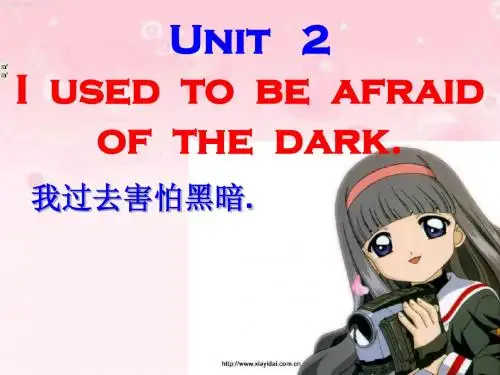
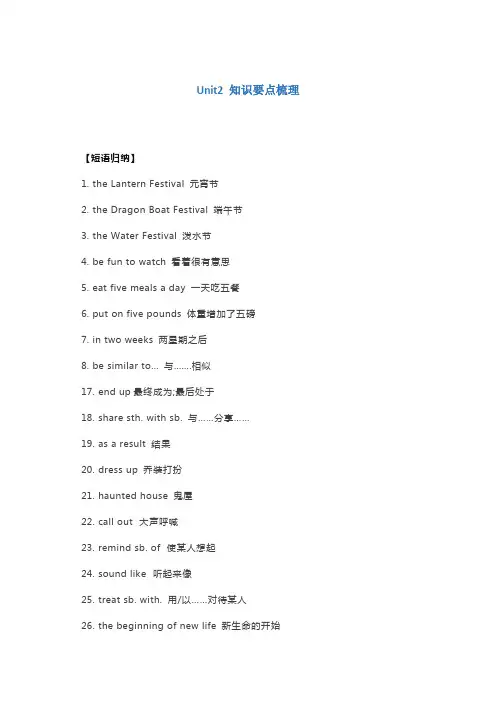
Unit2 知识要点梳理【短语归纳】1. the Lantern Festival 元宵节2. the Dragon Boat Festival 端午节3. the Water Festival 泼水节4. be fun to watch 看着很有意思5. eat five meals a day 一天吃五餐6. put on five pounds 体重增加了五磅7. in two weeks 两星期之后8. be similar to... 与.......相似17. end up最终成为;最后处于18. share sth. with sb. 与……分享……19. as a result 结果20. dress up 乔装打扮21. haunted house 鬼屋22. call out 大声呼喊23. remind sb. of 使某人想起24. sound like 听起来像 25. treat sb. with. 用/以……对待某人26. the beginning of new life 新生命的开始【考点详解】1. What + a(n) + 形容词+ 可数名词的单数形式+主语+谓语+其他)!多么……的……!2. How + 形容词/副词(+主语+谓语+其他)! ……多么……!3. be going to 将要/打算……4. in + 时间段在……后5. give sb. sth.=give sth. to sb. 给某人某物;把某物给某人6. plan to do sth. 计划做某事7. refuse to do sth. 拒绝做某事8. one of + 名词复数形式 ……之一【重点语法】一. 宾语从句宾语从句在复合句中作主句的宾语。
三大考点:引导词、时态和语序。
其中,语序必须是陈述句语序。
1. 常由下面的一些词引导:①由that 引导,表示陈述意义,that可省略He says (that) he is at home. 他说他在家里。

人教版九年级英语上册Unit 2单词及重点短语(附例句)Unit2 I think that mooncakes are delicious!【重点单词】1.Mooncake ['mu:nkeɪk] n. 月饼△The moon cake made by grandma is delicious!奶奶做的月饼味道美极了。
△People gather around the table to eat moon cakes and enjoy the moon on the 15th of August every year.每年8月15日,人们围坐在桌子旁吃月饼,赏月。
ntern [ˈlæntə(r)n] n. 灯笼△Red lanterns are hung on both sides of the street on the Lantern Festival. 元宵节的时候,街道两旁都挂着红灯笼。
3.stranger [ˈstreindʒə(r)] n. 陌生人△Don't talk to strangers.不要和陌生人说话。
△How many strangers have come to our community today?今天有多少陌生人来到我们的社区?4.relative [ˈrelətiv] n. 亲属;亲戚△On the first day of new year's day, our parents took us to visit relatives. 在元旦的第一天,我们的父母带我们去拜访亲戚。
5.put on 增加(体重);发胖△During the outbreak, many people put on a lot of weight. 在疫情爆发期间,很多人的体重都增加了很多。
6.pound [paund] n. 磅(重量单位);英镑△Grace has 500 pounds.格蕾丝有500英镑。
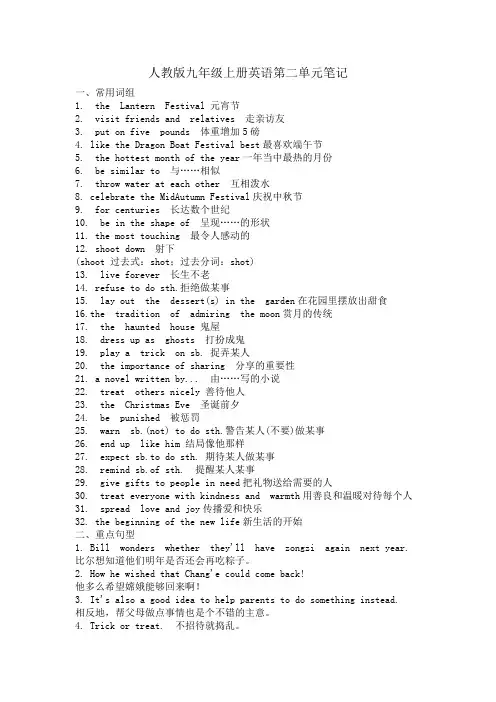
人教版九年级上册英语第二单元笔记一、常用词组1. the Lantern Festival 元宵节2. visit friends and relatives 走亲访友3. put on five pounds 体重增加5磅4. like the Dragon Boat Festival best最喜欢端午节5. the hottest month of the year一年当中最热的月份6. be similar to 与……相似7. throw water at each other 互相泼水8. celebrate the MidAutumn Festival庆祝中秋节9. for centuries 长达数个世纪10. be in the shape of 呈现……的形状11. the most touching 最令人感动的12. shoot down 射下(shoot 过去式:shot;过去分词:shot)13. live forever 长生不老14. refuse to do sth.拒绝做某事15. lay out the dessert(s) in the garden在花园里摆放出甜食16.the tradition of admiring the moon赏月的传统17. the haunted house 鬼屋18. dress up as ghosts 打扮成鬼19. play a trick on sb. 捉弄某人20. the importance of sharing 分享的重要性21. a novel written by... 由……写的小说22. treat others nicely 善待他人23. the Christmas Eve 圣诞前夕24. be punished 被惩罚25. warn sb.(not) to do sth.警告某人(不要)做某事26. end up like him 结局像他那样27. expect sb.to do sth. 期待某人做某事28. remind sb.of sth. 提醒某人某事29. give gifts to people in need把礼物送给需要的人30. treat everyone with kindness and warmth用善良和温暖对待每个人31. spread love and joy传播爱和快乐32. the beginning of the new life新生活的开始二、重点句型1. Bill wonders whether they'll have zongzi again next year. 比尔想知道他们明年是否还会再吃粽子。
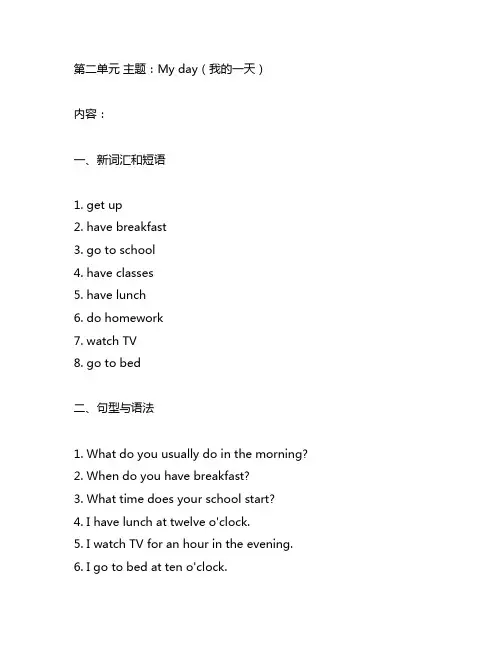
第二单元主题:My day(我的一天)内容:一、新词汇和短语1. get up2. have breakfast3. go to school4. have classes5. have lunch6. do homework7. watch TV8. go to bed二、句型与语法1. What do you usually do in the morning?2. When do you have breakfast?3. What time does your school start?4. I have lunch at twelve o'clock.5. I watch TV for an hour in the evening.6. I go to bed at ten o'clock.三、学习目标1. 学习描述一天的活动2. 学会使用一般现在时态来描述日常活动3. 能够用英语描述自己的一天四、学习重点与难点1. 一般现在时的使用2. 表达时间的用法3. 描述生活中的日常活动五、教学策略1. 通过图片、视频等多媒体教学方式引导学生学习日常活动的表达2. 利用小组活动,让学生通过互动讨论,提高口语表达能力3. 对一般现在时的特殊疑问句进行针对性讲解六、教学过程1. 每节课开始前,教师可以播放与日常活动相关的视频或动画,引导学生进入学习状态2. 引导学生用一般现在时描述自己的一天,鼓励他们用英语对日常活动进行描述3. 引导学生用英语向同桌介绍自己的一天,让学生在实践中掌握所学知识4. 听写一些日常活动相关的单词和短语,巩固学生的词汇掌握能力5. 组织角色扮演活动,让学生在实际运用中巩固所学的日常活动相关知识七、教学资源1. 多媒体设备(投影仪、电脑等)2. 有关日常活动的图片、视频资料3. 与日常活动相关的英语课文4. 学生教材和练习册八、教学反馈1. 通过课堂练习和作业检查,及时发现学生的问题,及时调整教学内容和方法2. 鼓励学生积极参与课堂讨论和活动,增强学生的学习兴趣3. 对学生的口语表达进行及时纠正和指导,提高他们的口语表达能力九、教学评估1. 课后作业检查2. 学生参与度评估3. 学生口语表达能力评估十、教学反思与改进1. 教师需要根据学生的实际情况,不断调整和改进教学方法2. 细化教学过程,提供更多的实际练习机会,帮助学生更好地掌握所学知识3. 不断提高教学质量,让学生在轻松愉快的氛围中学好英语结尾:通过这样的教学设计和教学过程,可以让学生在轻松愉快的氛围中学好英语,提高他们的口语表达能力和日常生活中的交际能力。
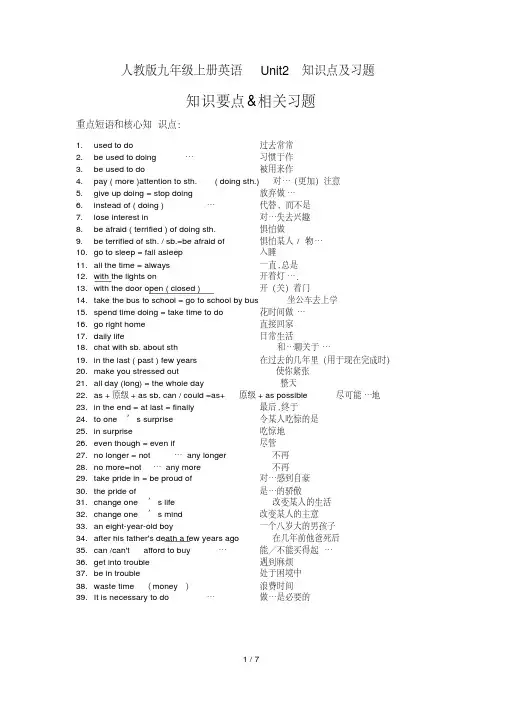
人教版九年级上册英语Unit2 知识点及习题知识要点&相关习题重点短语和核心知识点:ed to do 过去常常2.be used to doing … 习惯于作3.be used to do 被用来作4.pay ( more )attention to sth. ( doing sth.)对…(更加)注意5.give up doing = stop doing 放弃做…6.instead of ( doing ) … 代替, 而不是7.lose interest in 对…失去兴趣8.be afraid ( terrified ) of doing sth. 惧怕做9.be terrified of sth. / sb.=be afraid of 惧怕某人/ 物…10.go to sleep = fall asleep 入睡11.all the time = always 一直,总是12.with the lights on 开着灯….13.with the door open ( closed ) 开(关)着门14.take the bus to school = go to school by bus 坐公车去上学15.spend time doing = take time to do 花时间做… 16.go right home 直接回家17.daily life 日常生活18.chat with sb. about sth 和…聊关于…19.in the last ( past ) few years 在过去的几年里(用于现在完成时)20.make you stressed out 使你紧张21.all day (long) = the whole day 整天22.as +原级+ as sb. can / could =as+原级+ as possible 尽可能…地23.in the end = at last = finally 最后,终于24.to one’s surprise 令某人吃惊的是25.in surprise 吃惊地26.even though = even if 尽管27.no longer = not… any longer 不再28.no more=not… any more 不再29.take pride in = be proud of 对…感到自豪30.the pride of 是…的骄傲31.change one’s life 改变某人的生活32.change one’s mind 改变某人的主意33.an eight-year-old boy 一个八岁大的男孩子34.after his father's death a few years ago 在几年前他爸死后35.can /can't afford to buy …能/不能买得起…36.get into trouble 遇到麻烦37.be in trouble 处于困境中38.waste time (money )浪费时间39.It is necessary to do… 做…是必要的一. 核心知识点1. used to 过去常常做某事,暗指现在已经不存在的动作或状态. 后跟动词原形.或usedn’t to否定形式为: didn’t use to或Used…to…?疑问形式为: Did…use to…?*be/get used to 习惯于, to 为介词.I’m used to getting up early. I get used to gettingup early.2. wear 表示状态. put on 表示动作. dress + 人给某人穿衣服.3. on the swim team on 是…的成员,在…供职.4. Don’t you remember me? 否定疑问句.Yes, I do. 不, 我记得. No, I don’t是的, 我不记得了.5. 反意疑问句:①陈述部分的主语为this, that, 疑问部分主语用it; 陈述部分主语用these, those, 疑问部分用they 做主语.it? Those are your parents, aren’tthey?例: This is a new story, isn’t②陈述部分是there be 结构, 疑问部分仍用there例: There was a man named Paul, wasn’t there?③ I am 后的疑问句, 用aren’t I ?例: I am in Class 2, aren’t I?④陈述部分与含有not, no, never, few, little, hardly, seldom, neither, none 等词时,疑问部分用肯定.例: Few people liked this movie, did they?但陈述句中若带有否定前缀或后缀的单词时, 这个句子仍视为肯定, 后面仍用否定.she?例: Your sister is unhappy, isn’t⑤陈述部分的主语若为不定式或V-ing 短语, 疑问部分主语用it.it?例: To spend so much money on clothes is unnecessary, isn’t⑥陈述句中主语是nobody, no one, everyone, everybody 等指人的不定代词时,疑问部分用they做主语; 若陈述部分主语是something, anything, noting, everything 等指事物的不定代词时, 疑问部分用it 做主语.例: Nobody says one word about the accident, do they?it?Everything seems perfect, doesn’t⑦当主语是第一人称I时, 若谓动为think, believe, guess 等词时, 且其后跟宾丛,这时疑问句部分的人称, 时态要与宾语从句保持一致, 同时还要考虑否定转移.think he can finish the work in time, can he?例: I don’t开头时, 后用shall we?)⑧前面是祈使句, 后用will you? (let’s6. be terrified of 害怕的程度比be afraid of 深.7. miss: ①思念, 想念例: I really miss the old days.②错过, 未中, 未赶上, 未找到. 例: It’s a pity that you miss the bus.8. no more (用在句中)=not…any more (用在句尾) 指次数;no longer (用在句中)=not…any longer (用在句尾) 指时间.9. right: ① adj. 正确的, 对的, 右边的② n. 右方, 权利③ adv. 直接地.10. It seems that Yu Mei has changed a lot. = Yu Mei seems to have changed a lot.11. afford + n. /pron. afford + to do 常与can, be able to 连用.例: Can you afford a new car?The film couldn’t afford to pay such large salaries.12. as well as 连词, 不但…而且… 强调前者. (若引导主语, 谓动与前者在人称和数上一致例: Living things need air and light as well as water. 生命不仅需要水, 还需要空气和阳光.13. alone = by oneself 独自一人. lonely 孤独的, 寂寞的.14. in the last/past + 一段时间during the last/past + 一段时间与现在完成时连用.15. die (v.) dead (adj.) death (n.) dying (垂死的****相关习题:***一.补写单词:1.I’m a ___ of the dog .2.But now I’m more i_____ in the music .3.I u____ to be really quiet . Now I’m outgoing .4.I h____ to go out . It’s time for class.5.They are very f______6.Do you like c____ gum a lot ?7.Can you tell us what you used to be l____?8.We are having a music c _______.一.汉译英:1.人教版九年级上册英语Unit2 知识点及习题2.我对英语很感兴趣。
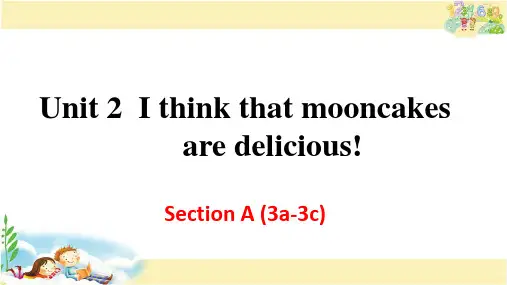
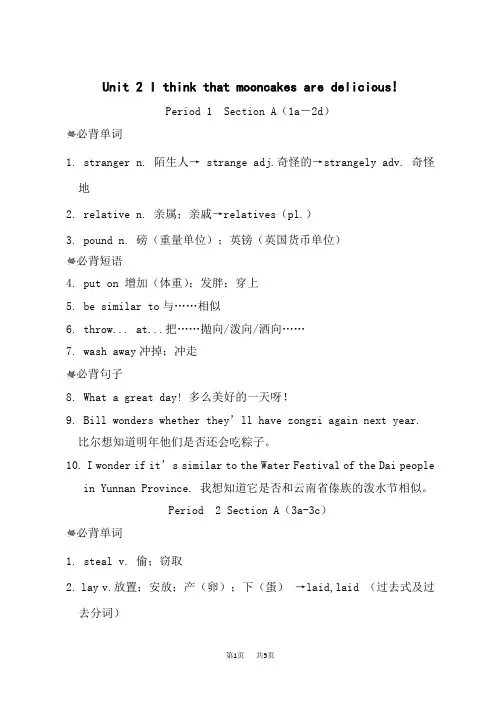
Unit 2 I think that mooncakes are delicious!Period 1 Section A(1a-2d)必背单词1. stranger n. 陌生人→ strange adj.奇怪的→strangely adv. 奇怪地2. relative n. 亲属;亲戚→relatives(pl.)3. pound n. 磅(重量单位);英镑(英国货币单位)必背短语4. put on 增加(体重);发胖;穿上5. be similar to与……相似6. throw... at...把……抛向/泼向/洒向……7. wash away冲掉;冲走必背句子8. What a great day! 多么美好的一天呀!9. Bill wonders whether they’ll have zongzi again next year. 比尔想知道明年他们是否还会吃粽子。
10. I wonder if it’s similar to the Water Festival of the Dai peoplein Yunnan Province. 我想知道它是否和云南省傣族的泼水节相似。
Period 2 Section A(3a-3c)必背单词1. steal v. 偷;窃取2. lay v.放置;安放;产(卵);下(蛋)→laid,laid (过去式及过去分词)→lay an egg 下蛋→lay out 摆开;布置3. dessert n.(饭后)甜点;甜食4. garden n. 花园;园子→gardener n. 园丁5. admire v. 欣赏;仰慕→look up to sb. 仰慕某人必背短语6. in the shape of...呈……的形状7. shoot down射下8. fly up to...飞到……9. call out 叫喊;大声说出10. as a result结果必背句子11. One night, he found that the moon was so bright and round thathe could see his wife there. 一天夜里,他发现月亮又亮又圆,以至于他能够看到他的妻子在月亮上。
人教版九年级英语上册Unit2重要知识点详解+练习一、【重点词汇】1. 重点单词(1)形容词folk民间的;民俗的This is an interesting folktale.这是一个有趣的民间传说。
dead死的;失去生命的His grandma has been dead for three years. 他的祖母已经去世三年了。
hunted有鬼魂出没的;闹鬼的According to the old people, this is a haunted place for ghosts. 据老人说,这是鬼魂出没的地方。
(2)名词mooncake月饼People are eating moon cakes and enjoying the moon on August 15.人们在八月十五吃月饼、赏月。
lantern灯笼On the night of new year's Eve, red lanterns are hung everywhere in the street.stranger陌生人Don't open the door to strangers.relative亲属;亲戚His relatives came to see her yesterday.goddess女神Chang'e is a goddess in the Moon Palace.嫦娥是月宫里的女神。
dessert (饭后)甜点;甜食Children like to have sweets after meals.孩子们饭后喜欢吃甜食。
garden花园;园子There are all kinds of flowers in the garden.花园里有各种各样的花。
tie领带I bought dad a beautiful tie as a birthday present.我给爸爸买了一条漂亮的领带作为生日礼物。
九年级上册英语unit2知识点人教版九年级上册英语Unit 2知识点九年级上册英语Unit 2是一个重要的学习单元,它涵盖了很多基本的英语知识点,帮助学生在英语学习中建立坚实的基础。
本文将围绕Unit 2的知识点进行讲解,帮助大家更好地理解和掌握。
主题1: 常见的英语固定搭配Unit 2中包含了许多常见的英语固定搭配,如"make a speech","take a chance"等。
这些固定搭配在英语中使用非常普遍,掌握它们对于学生的口语表达和写作能力有极大的帮助。
主题2: 介词的用法介词是英语中一个重要的语法点,它用来表示人、物、地点、时间等之间的关系。
在Unit 2中,学生需要掌握一些常见介词的用法,如"in","on","at"等。
同时,介词的用法也需要注意一些固定搭配,如"at the end of","in the middle of"等。
主题3: 定语从句的构成和用法定语从句在英语中起到修饰名词的作用,使句子更加精确和具体。
在Unit 2中,学生需要学会如何构成定语从句,并且掌握一些常见的关系代词和关系副词的用法,如"which","where","when"等。
主题4: 情态动词的用法情态动词是英语中非常常见的一种动词形式,它用来表示说话人对行为、态度和能力的判断和推测。
在Unit 2中,学生需要学会如何正确使用情态动词,如"can","could","should"等。
同时,情态动词的否定形式和疑问形式也需要掌握。
主题5: 名词的单复数形式名词的单复数形式是英语中一个基本的语法点,但是在实际应用中常常会出现错误。
在Unit 2中,学生需要学会名词的单复数形式以及一些不规则名词的变化规律。
人教版九年级英语上第二单元单词.短语和知识点练习题Unit 2 I think that mooncakes are delicious!lantern /læntə (r)n/ n. 灯笼p.9stranger /streindʒə (r)/ n. 陌生人p.10relative /relətiv/ n. 亲属;亲戚put on 增加(体重);发胖pound /paund/ n. 磅(重量单位);英镑folk /fəul k/ adj. 民间的;民俗的goddess /gɔdes/, /gA:d@s/ n. 女神p.11steal /sti:l/ v. (stole /stəu l/, stolen /stəu lən/)偷;窃取p.11lay /lei/ v. (laid /leid/, laid)放置;产(卵)lay out 摆开;布置dessert /di’zə:(r)t/ n (饭后)甜点;甜食p.11garden /ga:(r)dn/ n. 花园;园子p.11admire /ədmaiə (r)/ v. 欣赏;仰慕p.11tie /tai/ n. 领带v. 捆;束haunted /hɔ:ntid/ a. 有鬼魂出没的ghost /gəu st/ n. 鬼;鬼魂trick /trik/ n. 花招;把戏treat /tri:t/ n. 款待;招待;请客spider /spaidər)/ n. 蜘蛛p.13Christmas /krisməs/n. 圣诞节fool /fu:l/ n. 蠢人;傻瓜v. 愚弄adj. 愚蠢的lie /laI/ v. (lay /leI/, lain /leIn/) 平躺;处于novel /nɔvl/, /na:vl/ n. (长篇)小说eve /i:v/ n (尤指宗教节假日的)前夕;前夜bookstore /bukstɔ:(r)/ n. 书店p.17dead /ded/ adj. 死的;失去生命的p.14business /biznəs/ n. 生意;商业p.14punish /pʌnis/ v. 处罚;惩罚p.14warn /wɔ:(r)n/ v. 警告;告诫p.14present /preznt/ n. 现在;礼物adj. 现在的p.14nobody /nəu bədi/, /nəu ba:di/ pron. 没有人p.14warmth /wɔ:(r)mθ/ n. 温暖;暖和p.14spread /spred/ v. 传播;展开n. 蔓延;传播 p.14Macao /məkau/ 澳门p.10Chiang Mai /tʃiæn maI/, /dʒa:nmaI/ 清迈(泰城市)Halloween /hæləu i:n/ 万圣节前夕p.13St. /seint/ Valentine’s /væləntainz/ Day 情人节Clara /kla:rə/, /klerə/ 克拉拉(女名)p.10Santa /sæntə/ Claus /klɔ:z/ 圣诞老人p.14Charles /tʃa:(r)lz/ Dickens /dikənz/查尔斯•狄更斯(英)p.14Scrooge /skru:dʒ/ 斯克鲁奇n.(非正式)吝啬鬼Jacob /dʒeikəb/ Marley /ma:(r)li/雅各布•马利Unit 2 I think that mooncakes are delicious!一.短语归纳1.put on 增加(体重)发胖2.care about 关心在乎3.end up 最终成为,最后处于4.not only ……but also……不但……而且……5.shoot down 射下ed to do 过去常常做……7.remind sb. of 使某人想起8.give out 分发发放9.the water festival 泼水节10.the Chinese spring festival 中国春节11.next year 明年12.sound like 听起来像13.each other 互相彼此14.in the shape of 以……的形状15.on mid-autumn night 在中秋之夜16.fly up to 飞向y out 摆开布置e back 回来19.as a result 结果因此20.mother’s day 母亲节21.more and more popular 越来越受欢迎22.think of 想起认为思考23.dress up 装扮穿上盛装24.the importance of ……的重要性25.make money 挣钱26.in need 需要帮助处于困境中27.between ……and…… 在……和……之间28.the dragon boat festival 龙舟节29.the lantern festival 元宵节30.like best 最喜欢31.go to ……for a vacation 去……度假32.be similar to 与……相似33.wash away 冲走洗掉34.mid-autumn festival 中秋节35.shoot down 射下36.call out 大声呼喊37.the tradition of ……的传统38.at night 在夜里在晚上39.one……,the other……一个……,另一个… 40.Father’s day 父亲节41.have to 必须不得不42.play a trick on sb 捉弄某人43.the spirit of ……的精神44.care about 关心45.wake up 醒来46.the beginning of ……的开始二.用法集萃1.感叹句式一:What+(a/an)+adj+名词(+主语+谓语+其他)!多么……的……感叹句式二:How +adj/adv+主语+谓语+其他!……多么……!2.in+时间段在……后3.give sb. sth. 给某人某物4.plan to do sth 计划做某事5.refuse to do sth 拒绝做某事6.one of +名词复数形式……之一7.it +is+名词+动词不定式(to do sth)做某事是… 8.what …think of…?认为…怎么样?9.make sb do sth 让某人做某事ed to be 过去是……11.warn sb(not)to do sth告诫某人做某事12.tell sb(not)to do sth 告诉某人做某事13.decide to do sth 决定做某事14.promise to do sth 承诺、答应做某事第二单元检测一. 单项选择1 — I am going back to America for Thanksgiving Day.—. And we will miss you.A. Enjoy yourselfB. You’re welcomeC. That’s interestingD. The same to yo u2.Halloween is a popular festival North America and it’s October 31st.A.in,onB.in,inC.on, onD.on, in3.—are you going to Chiang Mai? —In two weeks.A.How longB.How soonC.How oftenD.When4.Chinese people eat mooncakes Mid-autumn nights.A.inB.onC.ofD.at5. he Chang’e to come back!A.How,hopedB.What,hopedC.How,wishedD.What, wished6. .I’ve five pounds because I ate too much meat.A.put upB.put offC.put awayD.put on7. — Linda, do Chinese people celebrate Easter Day?— No. This is the first time I’ve celebrated festival.A. the; theB. the; aC. /; theD. /; a8. — What did you do on April Fool’s Day?— I played a trick my friends.A. onB. toC. withD. at9. —Do you know if Jimmy to the party?—I am not sure. But if he , I will give him a big surprise.A. comes; will comeB. will come; will comeC. comes; comesD. will come; comes10 —Why do you call these cakes mooncakes?—Can’t you see? They are in the of the moon.A. sizeB. shapeC. weightD. taste11. —we have! There is dragon dance in the park. —Sounds great. We can’t miss it.A. What good luckB. How good luckC. What a good luckD. How a good luck12. Jenny keeps two pets. One is a dog, _________is a rabbit.A. anotherB. an otherC. the otherD. other13. Chang’e refused _________the magic medicine to Feng Meng.A. to giveB. gaveC. givingD. give14. ---He dressed up ________a ghost last night. How scary!---Take it easy! He just played a trick ________us.A. in, onB. in, inC. as, onD. as, in15. — Can we visit Hong Kong this summer holiday?— I wonder it is the best time to go there.A. ifB. whenC. whatD. how二、用所给单词适当形式填空。
人教版九年级上英语第二单元单词短语和知识点Unit 2: I Think That Mooncakes Are us!XXX: a portable light that is enclosed in a paper or metal case and can be hung up for XXX)Stranger: a person whom one does not know or with whom one is not XXX)Relative: a XXX marriage。
a family member。
Put on: to gain weight。
to XXX。
Pound: a unit of weight equal to 16 ounces or 0.4536 kilograms。
the basic ary unit of the UK。
XXX。
Goddess: a XXX)Steal: to take something without n or legal right and without intending to return it。
(p.11)Lay: to put something down XXX。
It can also refer to the nof a XXX。
Lay out: to arrange something in a particular way。
to design something。
Dessert: a sweet course served at the end of a meal。
(p.11)Garden: a piece of land where flowers。
vegetables。
or XXX)Admire: XXX)XXX: a long。
narrow piece of cloth worn around the neck。
typically by men。
人教版九年级上册英语unit2知识点九年级上册英语Unit 2 知识点探究九年级上册的英语课程给学生们带来了更多的挑战,Unit 2更是如此。
在这个单元中,学生将学习有关健康生活方式的话题,并了解有关饮食、运动和习惯的表达。
下面我们将对Unit 2的主要知识点进行探究。
1. 基本运动动词:在Unit 2中,学生将学习一些基本的运动动词,如run(跑)、walk(走)、swim(游泳)等。
这些动词用于描述人们进行体育运动或日常活动的行为。
学生在学习这些动词时,还可以通过与其他学生一起进行小组活动或角色扮演来巩固所学知识。
2. 健康生活方式的表达:在Unit 2的课程中,学生将学习如何用英语表达健康生活方式。
他们将学习一系列有关食物和饮食的词汇,如meat(肉类)、fruit(水果)等。
此外,他们还会学习如何表达自己的饮食习惯,比如"I eat a balanced diet."(我吃均衡的饮食)。
通过学习这些表达方式,学生将能够更好地理解和交流与健康生活方式相关的话题。
3. 健康生活建议的表达:学生在Unit 2中还将学习如何给予健康生活建议。
他们将学习一些与建议相关的动词和词组,如should(应该)、need to(需要)等。
通过学习这些表达方式,学生将能够更好地给予他人关于健康生活方式的建议。
4. 过去式的构成和运用:在Unit 2的课程中,学生还将学习过去式的构成和运用。
他们将学习一些日常动词的过去式形式,并了解一些表示过去的时间状语词,如yesterday(昨天)、last week(上周)等。
通过学习这些知识,学生将能够更好地描述过去的事件和经历。
5. 祈使句的构成和运用:在Unit 2中,学生将学习祈使句的构成和运用。
他们将学习如何用祈使句来给予他人命令、建议或请求,比如"Take some exercise."(做些运动。
)或"Don't eat too much junk food."(不要吃太多垃圾食品。
人教版九年级英语上册第二单元学习目标1.掌握描写人物的技巧和词汇。
2.掌握下列知识点:■重点词汇:sure, used,airplane, terrify on■重点短语:①used to②wait a minute③play the piano④be interested in⑤on the swim team①be terrified of②go to sleep③be alone④be afraid of■重点句型:①Mario,you used to be sh ort, didn’t you?②Don't you remember me?③I go to sleep with my bedroom 1ight on.■语法:used to句式的用法预习导学Ⅰ.英汉短语互译。
1.过去经常2.on the swim team3.弹钢琴4.wait a minute5.对……感兴趣Ⅱ.预习Section A(1a-2c)部分,完成下列句子。
6.I(过去)be short,but now I am tall.7.My sister used to(害怕)the dark.8.He used to be quiet,(是吗)?合作研讨一、重点单词与短语1.sure adv.的确【拓展】(1)be sure一定要;务必(2)make sure弄清楚;确保【跟踪训练】(1)人的确在变化。
People change.2.play the piano弹钢琴【精解】play与乐器类名词连用时,名词前要加定冠词the,而与球类名词连用时,名词前不要加定冠词the。
例如:play the violin拉小提琴;play soccer踢足球【跟踪训练】(2)她在四岁时学习弹钢琴。
She learned to at the age of four.3.be interested in对……感兴趣,后跟名词、代词、动名词或从句。
【拓展】其同义短语为take an interest in【跟踪训练】(3)我对他说的话感兴趣。
I what he said.4.terrify .使害怕;使恐惧例如:Don't terrify the lame boy with ghost stories.不要用鬼故事吓唬这个小孩。
【拓展】be terrified of意为“非常害怕的;极度恐惧的”,后跟名词、代词或动名词。
其同义短语为be afraid of。
【跟踪训练】(1)She used to be afraid of snakes(同义句转换)She used to snakes.5.alone adj & adv.独自;单独例如:The o1d man lives alone.那位老人单独居住。
【拓展】短语1eave/1et sb .alone意为“别打扰某人”。
【拓展】辨析:alone/1onelyalone意为“独自;单独”,不含有感情色彩;10nely指人孤独、寂寞,有浓厚的感情色彩。
【跟踪训练】(2)尽管我独自居住,但我并不感到孤独。
Although I 1ive,I dont feel.二、重点句型与语法■句型1.Mario,you used to be short,didn't you?玛利奥,你过去个子矮,是不是?【精解】used to意为“过去经常;以前常常”,后跟动词原形,“used to do sth.”这一结构表示“过去常常做某事”,暗指现在不再做了。
【跟踪训练】(1)他以前放学后常常踢足球。
He play soccer after schoo1.【辨析】used to do/be(get)used to doing/be used to do/be used for/be used by①be(get)used to doing意为“习惯于……”,短语中的to为介词,后跟动名词。
②be used to do意为“被用来做某事”;be used for意为“被用于做某事”,后跟动名词;be used by意为“被……使用”,后跟动作的执行者。
三个短语都是use的被动语态。
【跟踪训练】(2)我爸爸以前常常晚饭后看电视,现在他习惯于散步。
My father watch TV after supper.Now he taking a walk.(3)刀被用来切东西。
Knives cutting things。
2.I go to sleep with my bedroom light on.我开着卧室的灯睡觉。
【精解】①go to sleep意为“入睡;睡着”,指渐渐睡着的过程。
【辨析】go to bed/go to sleep/sleep/asleepgo to bed指“上床睡觉;就寝”,强调动作;go to sleep指“入睡”,强调过程;sleep v.意为“睡觉”,be sleeping正在睡觉;asleep adj.意为“睡着的”,强调“睡着的”状态,短语:fall asleep入睡;be asleep睡着。
【跟踪训练】(1)Don't rum on the TV. Grandma now.A. is sleepingB. will sleep C .slept D. sleeps【精解】②with my bedroom light on意为“开着卧室的灯”’on为形容词,意为“开着的;接通的;工作着的”。
【拓展】turn on打开(电器、电源等);on TV通过电视;on the swim team在游泳队;on Monday morning在星期一早上【跟踪训练】(2)房间的灯亮着,我想他可能在家。
The light is in the room. I think he might be at home.【拓展】“with+名词+介词/形容词”结构,在句中作状语,表示伴随状况。
【跟踪训练】(3)夏天我喜欢开着窗子睡觉。
I like to sleep the window in summer.(4)老师手里拿着一本书走进了教室。
My teacher went into the classroom a book his hand.■语法used to结构①used to的用法used to表示“过去经常;以前常常”,指过去的习惯性动作或状态,现在已不再存在,其中to是动词不定式符号,后接动词原形。
例如:Mother used to get up early.我妈妈过去经常起得很早。
②一般疑问句:Used sb to...或Did sb use to...否定句:used to的否定形式为didn't use to或usedn't to,口语中常用usedn't to。
【跟踪训练】(1)He used to be outgoing;(变为否定句)He be outgoing.③反意疑问句:含有used to的句子,其反问部分用didn't或usedn't。
【跟踪训练】(2)他过去吸烟,是吗?He used to smoke,?④there used to be意为“过去曾经有”。
【跟踪训练】(3)这座房子前面曾经有一棵大树。
a tall tree in front of the house.当堂检测一.根据所给的词的正确形式填空1..You 1ike music. What about(she)?2.He's afraid(swim)in the river.3.Lucy was(terrify)by what I said just now.4.Are you afraid of(be)alone?二.根据汉语提示完成句子1.请等一会儿,汤姆马上来。
P1ease.Tom is coming at once.2.难道你不记得我的名字了吗?you my name?3.我喜欢游泳,我在游泳队。
I 1ike swimming and I am.4.你过去常常踢足球吗?you play football?5.他以前经常在电视上观看NBA比赛。
He used to NBA games.6.我喜欢开着卧室的灯睡觉。
I 1ike to sleep my bedroom light.7.你过去常常留长发吗?you to have long hair?rry现在仍然害怕在众人面前说话。
Larry is still speaking in front of a group三..单项选择()1.She in a toy factory,but now she has a shop of her own.A. is used to work B .was used to work C. used to working D. used to work()2.—The elector fan can blow away the terrible smell in the room,can it?—It is hard to say,but you may have a try.A .easily B. hardly C. quickly D .finally()3.There a swimming poo1 here.A. used to have B .was used to be C .used to be D. is used to having()4.—Don't you like playing soccer? —.I often play after schoo1.A. Yes,I doB. No I don'tC. Yes,I don'tD.NO,I do()5.—I used to go out for a walk after supper. —.A. So do I B So did I C So can I D .So am I()6.I don't 1ike to go to sleep the 1ight on.A. inB. to C with D .and()7.My teacher often tells us not to be afraid of mistakes.A. doB. doingC. make D .making()8.His brother is good at football,and he is his schoo1 team.A. atB. inC. onD. of()9.I used to late,but nom I am used to early.A. get up;get upB. get up;g etting upC. getting up;get up D .getting up;getting up()10.—Oh,Steve. Overhere. Don't yon remember me? —.You’re Paula,aren't you?A .Yes,I didn'tB .Yes,I do C.NO,I do D.NO,I did()11.The o1d man 1ives,but he never feels.A. alone;a1oneB. lonely;1onelyC.1onely;a1oneD.alone;lonely()12.DaVid hardly has time for party,he?A. don'tB. doesn'tC. doesD. do()13.Today computers in both cities and towns.A. were usingB. are usedC. were usedD. are using()14.Mrs White a reporter .She has retired.A. used to beB. uses to beC. is used to beD. used to()15.We in this pool when we were young,but now is fish.A. are used to Swim;used to B .are used to swimming;is used to keepC. used to swim;used to keep D .used to swim;is used for keeping四..用所给单词的适当形式填空Mr Turner used11 (go)fishing in the countryside every week. It was his favorite sport. He often fished for several hours without12 (catch)anything at a11.But this didn't worry him .He always went with an empty bag.” You must give up13 (fish),”his friends said.” It’s a waste of time.” But they don't realize net hinging only enjoy14 (sit)in a boat and doing nothing at a11.Fishing can make me15 (forget)the noise of the city and 1ive quietly for some time. “He always said to himself.11.12.13.14.15.五.完形填空Sixty years ago,Guangzhou was a small and poor city. People in the city 1ived a6 life. People7 o1d c1othes and the co1or of their clothes was very single. People always ate fish and vegetables because they were8They ate other meat only at the9.The buildings in Guangzhou10 o1d and small.Now11years has passed. People's 1ife has changed12.When you walk on the street,you can see many tall buildings .Many of them are more than twenty13.The people there wear co1orful and beautiful clothes and they also wear c1othes made 14the world. They can also eat many kinds of foreign food. They can eat a11 kinds of meat 15any time when they 1ike.Who has made these changes a11 a-above? Our great government! The government always puts people in the first place when making po1icy(政策).()6.A.hard B. rich C. happy D. good()7.A.put B .wore C .made D. bough()8.A.dear B. poor C. cheap D. beautiful()9.A.day B. night C .morning D .festival()10.A.were B .are C .is D .was()11.A.twenty B. sixty C .fifty D .thirty()12.A.a few B. kinds Of C. a lot D lots of()13.A.house B. room C. family D .floors()14.A.a11 over B. more than C. over there D .too many()15.A.on B. in C .at D .of七..阅读理解I used to travel by air a great deal when I was a boy. My parents used to 1ive in South America and I used to fly there from Europe in the ho1idays.A flight attendant Would take charge of me and I never had an unpleasant experience.1 am used to traveling by air and only on one occasion have I ever felt frightened. After taking off,we were flying low over the city and slowly gaining height, when the plane suddenly turned round and flew back to the airport. While we were waiting to land,flight attendant to1d us to keep calm and to get off the plane quickly as soon as it had touched down .Everyone on board was worried and we were curious to find out what had happened. Later we learnt that there was a very important people on board. The po1ice had been to1d that a bomb had been planted on the plane. After we had1anded,the plane was searched thoroughly(彻底地).Fortunately,nothing was found and five hours 1ater we were able to take off again.根据短文内容,判断正(T)误(F)()16.The writer used to take the bus when he was a boy.()17.The writer's parents used to 1ive in South Africa.()18.While they were waiting to 1and,an airhostess to1d them to be calna.()19.Nothing was found and nine hours later they could take off again.()20.There was really a bomb on the plane.。